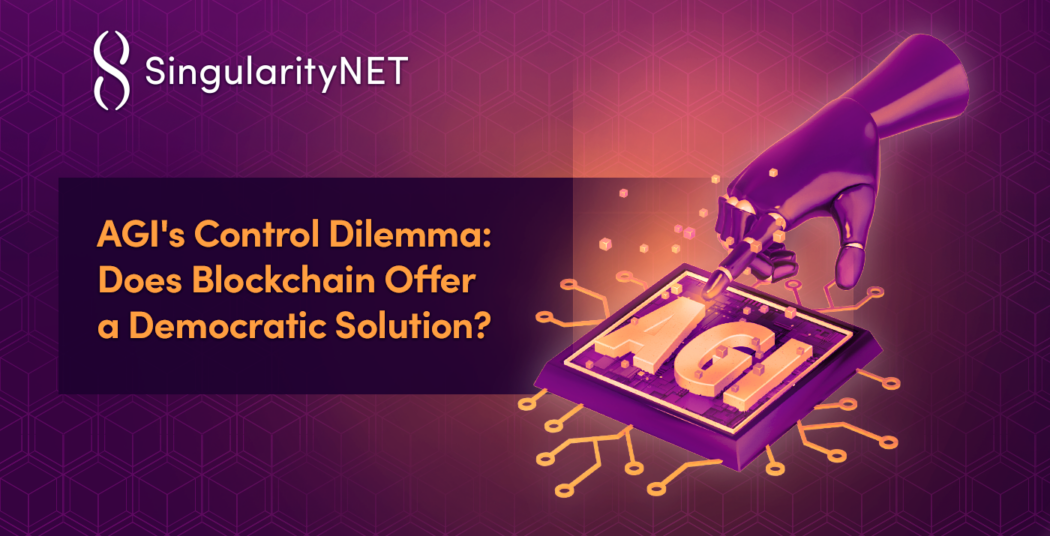
Imagine you live in a world where a single entity, be it individual or organization, owns and controls an Artificial General Intelligence (AGI) system with intelligence surpassing human capabilities. By prioritizing profit and control over global well-being, this sort of concentration of power, especially over such a technology, could function with little transparency or accountability. This scenario might result in ethical dilemmas, exploitation, and an entity that could have widespread, detrimental effects on society without checks and balances to mitigate harm.
Now, envision an alternative: you live in a world where AGI is decentralized and collaboratively developed with complete transparency. In this decentralized model, the AGI is shaped by a multitude of perspectives, reducing biases and promoting ethical outcomes. Access to AGI’s benefits is democratized, and the benefits of AGI are accessible to the global community and all sentient beings.
Which of the two scenarios would lead to a better outcome for humanity?
Understanding the imperative for decentralization in AGI involves acknowledging both its immense potential and the significant risks it poses. AGI represents a significant leap from current AI systems, which are typically narrow in scope and designed for specific tasks; instead, AGI aims to replicate the full spectrum of human intelligence, enabling machines to perform any intellectual task that a human being can.
Naturally, this capability could revolutionize industries, solve complex global challenges, and enhance the quality of life. However, this centralization could lead to the monopolization of power, concentrating immense influence within corporations or governments and resulting in imbalances and potential abuses. Additionally, there are ethical and bias concerns, since AGI developed without diverse input may inherit the biases of its creators, leading to unethical outcomes.
To mitigate these risks, fostering a decentralized approach to AGI development may currently be one of the most important tasks for humanity.
A decentralized framework ensures that AGI development is transparent, with open processes allowing for scrutiny and understanding of how AGI systems operate; inclusive, by encouraging diverse participation that prevents the dominance of a single perspective or interest; and accountable, through distributed governance mechanisms that enable collective oversight and ethical alignment.
Blockchain technology emerges as a potential solution to decentralize AGI, ensuring that its development and deployment are transparent, democratic, and aligned with the greater good.
By leveraging blockchain’s governance capabilities, we can embed democratic decision-making directly into the development and deployment of AGI, ensuring it remains a shared resource aligned with the values and ethics of a global community. By doing this, we can distribute the power of AGI, fostering an ecosystem where innovation thrives, and benefits are shared globally.
Here are just a few of the potential advantages to using blockchain as a cornerstone of this decentralized framework.
Blockchain facilitates decentralized governance through consensus mechanisms and voting protocols. Stakeholders can participate in decision-making processes regarding the development and deployment of AGI technologies. This collective governance ensures that AGI aligns with shared ethical standards and societal values, preventing unilateral control by any single entity.
Let’s not forget – decentralization lowers barriers to entry, allowing individuals and organizations from around the world to contribute to and benefit from AGI. This democratization promotes innovation by tapping into a global pool of talent and ideas. It also ensures that the benefits of AGI are not confined to wealthy nations or corporations but are accessible to all.
And ultimately, by incorporating diverse perspectives into the AGI development process, we reduce the risk of embedding biases and unethical practices within AI systems. Decentralized governance allows for the establishment of ethical guidelines that reflect a broad consensus, ensuring that AGI technologies are developed responsibly.
AGI development demands immense computational resources to process vast datasets and run complex algorithms. Blockchain networks can harness the collective computing power of globally distributed nodes. By incentivizing participants to contribute their computational resources through token rewards, blockchain creates a scalable and cost-effective infrastructure for AGI development. This democratizes access to computational power, reducing reliance on centralized data centers owned by a few entities.
Data is the lifeblood of AGI. Blockchain enables secure, transparent, and tamper-proof data sharing among participants. Individuals and organizations can contribute data to the AGI network while maintaining ownership and control over their information. This fosters a collaborative environment where high-quality, diverse datasets can be pooled for AGI training without compromising privacy.
Blockchain’s transparent ledger enables the tracking of AGI decision-making processes. This transparency builds trust among users and stakeholders, as actions taken by AGI systems can be audited and verified. It also facilitates accountability, as unethical or harmful behaviors can be traced and addressed promptly.
Will we allow this transformative technology to be centralized in the hands of a few, or will we strive for a decentralized model that promotes transparency, inclusivity, and accountability?
An exemplar of the decentralization effort is the formation of the Artificial Superintelligence Alliance (ASI Alliance). The Alliance represents a unified initiative where organizations, researchers, and stakeholders come together to ensure that AGI development is guided by shared values and serves the greater good. By pooling resources and expertise, the ASI Alliance aims to democratize AGI, making its benefits accessible worldwide and preventing unilateral control by any single entity.
The Alliance is a real-world example of how integrating blockchain into AGI development creates the opportunity to build a decentralized, democratized AGI that serves everyone, leading us toward a more equitable and prosperous future.
The question remains: Will we seize this moment to build a decentralized, democratized AGI that serves all of humanity? The path forward is ours to choose, and the time to act is now.